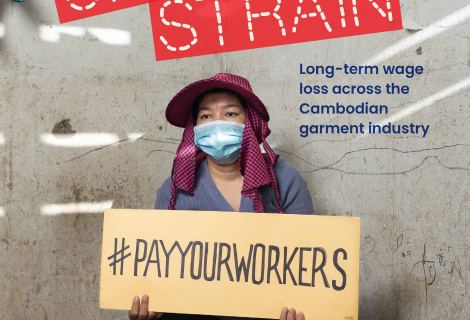
The research finding from the survey of 308 garment workers, 65% of whom were women, consisting of interviews conducted by CATU and CCAWDU field organisers between December 2022 and January 2023, a series of focus group discussions with previously surveyed workers and union representatives to validate key findings and follow-up inquiries, and a desk review of factory-issued payslips, shipping and export data, and all relevant and existing literature.
Key Findings
- Decreased monthly wages: at least 25% of surveyed workers report a decrease in monthly take-home pay since 2020, excluding overtime. Despite a legal minimum wage increase of US$10 between 2020 and 2023, the majority of surveyed workers are earning less now than they were in 2020, before the Covid-19 crisis hit.
- Systemic dependence on overtime pay: Overtime pay decreased by more than 60% for surveyed workers from 2020 to 2023. Workers have gone from earning, on average, an additional US$36 before the pandemic hit, to an average US$12 per month in 2023. In a country where garment workers were already overly reliant on overtime to supplement their minimum wage, they have had to cope by cutting back on daily food intake and educational expenses for their children.
- Soaring Debt: 91% of surveyed workers report to holding at least one current loan, with 70% pointing to the pandemic as a direct link to increased debt. Amidst the growing cost of living crisis, workers are increasingly turning to informal loans that carry interest rates as high as 20%, with some workers reporting alarming new trends such as borrowing from factory supervisors directly.
Key recommendations to apparel and footwear brands:
- Publish and maintain a complete list of supplier factories they source from across all tiers of their supply chain, including subcontracted suppliers. • Immediately resolve wage theft and severance disputes in supply chains so that garment workers receive full wages, severance payments and other legal entitlements as a matter of urgency.
- Publicly commit to developing policies and procedures to pay all workers in their supply chains a living wage, and release a detailed plan outlining the timeframe and steps that will be taken to ensure all the factories they work with are paying workers a living wage.
- Publish and enforce a responsible purchasing practices policy that is aligned with brands obligations under the UN Guiding Principles on Business and Human Rights and the OECD Due Diligence Guidance for Responsible Supply Chains in the Garment and Footwear Sector.
- Brands’ purchasing practices should provide factory suppliers with order stability and adequate time for planning and implementation of orders. Payments should be timely, and the costing model used by companies should enable the payment of living wages and benefits, the provision of social protection and the implementation of worker safety protections
Key recommendations to the Royal Government of Cambodia:
- Increase the minimum wage to ensure that base salaries across the garment industry are sufficient to cover basic needs such as food, housing, utilities and education, reducing the need for workers to take on debt to cover basic expenses.
- Consider re-examining the Labour Law in the context of factories reducing working hours to ensure that the Minimum Wage is guaranteed regardless of work hours or production targets.
- The Ministry of Labour and Vocational Training should reinforce their implementation mechanisms, such as workplace inspections, to ensure factories are not using production targets to pay workers below the minimum wage.
- The National Bank of Cambodia should consider reviewing and regulating interest rates for micro-finance institutions, banks, and informal lenders to align with international standards.
- Consider implementing a policy of rent controlled housing for garment workers to address price gouging practices.
Key recommendations to governments in Australia, the European Union and the United States:
- The EU and its Member States should finalise and implement ambitious legislation on corporate sustainability due diligence. Such legislation should include requirements that, in the context of their due diligence duty, companies shall adapt their business and purchasing practices and ensure workers in their value chains are paid a living wage.
- The EU should work on dedicated legislation to ban the use of Unfair Trading Practices in the textile and clothing sector. Practices such as prices below the cost of production, late payment or late order cancellation should be outlawed.
- The EU and US should maintain the lapse in preferential trade agreements with Cambodia until concrete and sustainable improvements to human rights and labour rights in the country are made.
- Australia and the US should consider looking to the EU for guidance in creating their own legislation to ensure supply chain oversight. Both countries should adopt legislation that mandates that companies operating overseas undertake gender-responsive human rights due diligence. This legislation should establish an accessible redress mechanism that is independent, well-resourced, accountable, and transparent which has powers to investigate and provide effective, enforceable remedies.
- Australia should align its trade agreements with international human rights and gender equality obligations. Binding labour rights provisions should be included in all agreements, and provisions that undermine workers’ rights, directly or indirectly in Australia or in partner countries, should be excluded. Trade agreements should include redress mechanisms that enable workers to access compensation in response to cases of human rights violations.